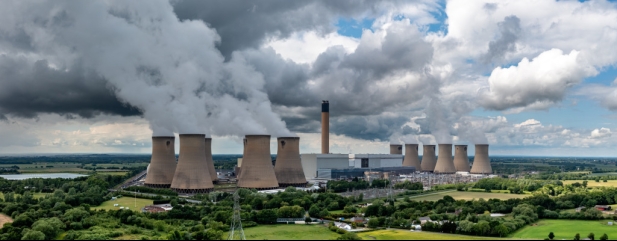Archived article
Please note that tax, investment, pension and ISA rules can change and the information and any views contained in this article may now be inaccurate.
Why we need a long-term energy policy (but may not get one)

What will Jeremy Hunt’s windfall tax changes mean for energy infrastructure investment in the UK, it’s a fair question and one that’s already generated more than a few headlines.
Both the bosses of Shell (SHEL) and SSE (SSE) have warned their respective companies will have to review their slate of investments because of the changes, changes which have thrown previous ‘fiscal calculus’ up in the air.
On paper their comments might be viewed as brinkmanship, a bit of posturing and bluster in response to penalties on stunning profits which have come at the expense of UK households. But in reality, the Government must be hyper aware that the levies could fundamentally undermine UK plans both for security of supply and the ambition to decarbonise the power market by 2035.
WHY ENERGY INVESTMENT IS A LONG GAME
Building and expanding energy infrastructure is a long game, it takes years to plan and even longer to reach fruition.
Consider it was 2010 when Hinkley C was initially given a tentative green light. It’s been beset with problems not least Covid lockdowns. Even without the pandemic building a complex site the size of a small town was would inevitably have struggled both in terms of time and budget.
From concept to conclusion every step has to be carefully planned. A skilled labour force doesn’t just magically materialise it needs to be built and companies like EDF (EDF:EPA) work alongside colleges and universities to ensure what’s being taught nearby will deliver for both students and potential employer.
Taking that leap requires the knowledge that the investment will generate substantial returns. Investors have to be wooed; numbers need to be interrogated.
Just because energy prices are sky high at the moment doesn’t guarantee they’ll stay that way. In fact, the assumption is that the current geo-political environment has created an unsustainable market, one which can only head one way.
It’s been 15 years since I sat next to the boss of a northern utility company at an industry dinner. Our conversation was coloured by the fact that I was a reporter but despite the obvious caution with which he spoke he was clearly frustrated with the lack of long-term vision the political system allowed.
BUT POLITICIANS THINK IN THE SHORT TERM
The election cycle creates short-termism, what possible gain could a government get from green lighting a series of hugely expensive projects that won’t deliver results until long after those in power have relinquished their position?
It was a time when a number of older power stations were reaching the end of their lifetimes and questions were being asked about whether any of them could be revitalised, reworked for other fuels? Ultimately only one of the three in question made the change and Drax (DRX) is still an integral part of the UK’s generating provision.
The transition to net zero has helped focus political minds and Russia’s invasion of Ukraine has only served to further highlight the need for the UK to be as self-sufficient as possible when it comes to its energy needs.
The shift to clean green energy has created opportunity and appealed to all investors, not just those hunting for the E in ESG.
The green economy has progressed at speed and projects that once looked a bit woolly are now delivering some serious cash.
WHY IT’S A LACK OF STABILITY WHICH MATTERS
It’s not windfall tax itself that worries many, in fact the immediate reaction from investors once they’d had chance to scrutinise the small print suggests they’re hyper aware it could have gone much, much further. It’s more the fact that the electricity generator levy doesn’t at present look like it will be subject to any investment allowance unlike with oil and gas .
Gas has long been seen as an integral part of the transition process and if that gas can be extracted from the North Sea, if it can add to the treasury tax take, so much the better.
And this is Mr Hunt’s dilemma. The public are hurting, they’ve been asked to pay more to support our public services at a time they’re budgets are being squeezed by price rises, with energy taking the biggest bite out of the pot.
A recent survey carried out for AJ Bell found that 81% of those surveyed supported tax rises and the tax hike that got the biggest support was a windfall tax on energy company profits.
But additional taxes coupled with a lack of consistency muddies the waters. Is the UK the place for investors in clean energy or does it now have a great big question mark over it? If we are to make our net zero target a reality the Government will have to work hard to convince the industry and investors it’s still the former.
DISCLAIMER: Financial services company AJ Bell referenced in this article owns Shares magazine. The author of this article (Danni Hewson) and the editor (Tom Sieber) own shares in AJ Bell.
Important information:
These articles are provided by Shares magazine which is published by AJ Bell Media, a part of AJ Bell. Shares is not written by AJ Bell.
Shares is provided for your general information and use and is not a personal recommendation to invest. It is not intended to be relied upon by you in making or not making any investment decisions. The investments referred to in these articles will not be suitable for all investors. If in doubt please seek appropriate independent financial advice.
Investors acting on the information in these articles do so at their own risk and AJ Bell Media and its staff do not accept liability for losses suffered by investors as a result of their investment decisions.
Issue contents
Feature
- Fund manager optimism starts to return as equity inflows hit 35-week high
- Finding great value shares: how fund managers do it and how you can too
- Watch out for changes to dividend and capital gain allowances
- Is the hardy US shopper starting to feel the pinch?
- How I invest: the big lessons learned from a stock-picking journey
- Emerging markets: Views from the experts
- Find out about the top performing Indonesian market
Great Ideas
News
- Are dividends in the UK banking sector safe during a recession?
- How Currys shares have charged higher ahead of key trading period
- Why Zoom woes continue as it lowers revenue guidance
- New surge in China Covid cases halts rally in Asia-related stocks and investment funds
- Signs of life appear in the UK IPO market: Grindr shares gain 330% on debut
- Hilton Food shares in freefall after second warning in two months
 magazine
magazine








